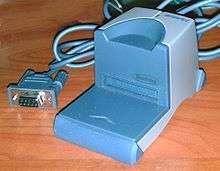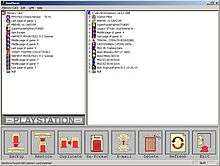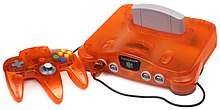DexDrive
DexDrive is a brand of game console memory card readers that allowed data to be accessed by a PC. The DexDrive products were made by now-defunct InterAct for use with PlayStation and Nintendo 64 memory cards. It was shipped to retail stores in January 1997.
 DexDrive for PlayStation | |
| Date invented | 1996 |
|---|---|
| Invented by | InterAct |
| Connects to | Motherboard via:
I/O card via: |
Design
Mainly, the purpose of the device was to provide a more economical solution for game data storage. The DexDrive was sold at retail for roughly the same price as two Sony- or Nintendo-branded memory cards—$50 MSRP in the U.S. The official cards had a capacity of only 128 KB, far less than even a floppy disk. Cost and capacity were much more favorable on a PC due to the efficiency of hard disk drives. For the cost of two memory cards, DexDrive owners had the opportunity to store effectively limitless amounts of game data by transferring files as needed between the memory cards and the PC. Additionally, as PC files, game data could be shared over the Internet or be used with console emulators.

The product connects to the PC via serial port and comes shipped with a Windows driver application, called DexPlorer, on two 3.5" floppy disks. Updated software, which addressed many of the problematic issues in the pack-in software, was available for several years on the InterAct corporate website. Unofficial software has also been written by various authors. In some cases, competitors supported the DexDrive in order to claim de facto compatibility. In other cases, DexDrive users wrote their own software to address the shortcomings of DexPlorer.
See also
External links
- Download DexPlorer software from a fansite
- Download user-created Dexter software
- Download PSX Game Save Editor an all-in-one tool for Game Saves
- Download MemcardRex an advanced Memory Card editor
- N64 Drivers from a German site Windows XP or lower
